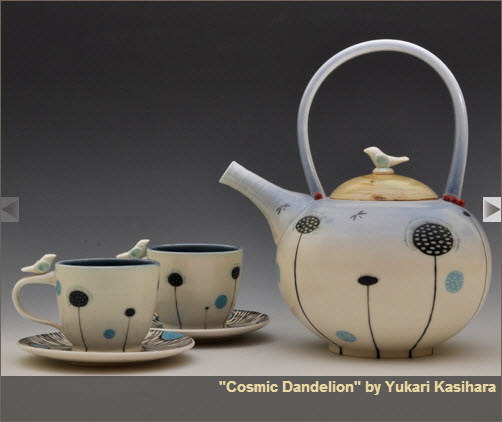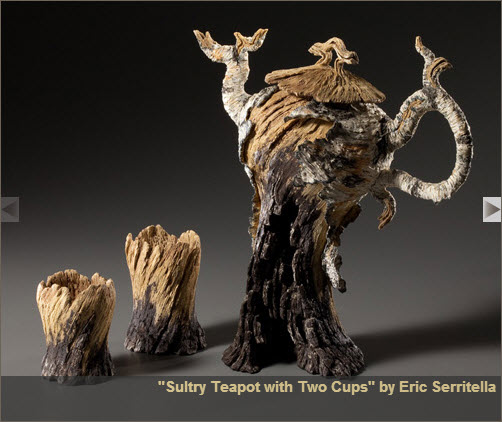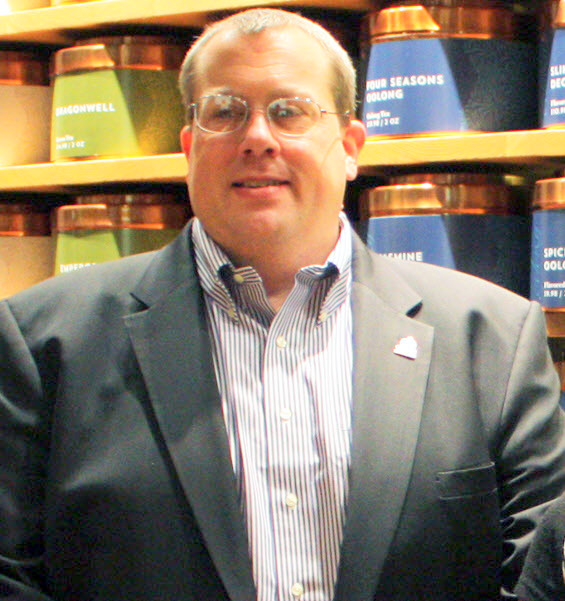What tea professionals need to start the week —
 Whimsical teapots are the work of 50 artists celebrating the Fif-TEA Anniversary invitational of the Crafts Alliance in St. Louis, Mo….China and the U.S. make a climate change pledge against a backdrop of air pollution and a summer drought that damaged China’s most valuable tea growing region… the World Bank investigates investments in Assam where plantation practices are subject to a Columbia University report critical of Amalgamated Plantations Private Ltd. (APPL)… Teavana founder and CEO Andy Mack retires from Starbucks Coffee Co., which names Executive Vice President Annie Young-Scrivner president of the specialty tea company which has grown since 1997 to 366 stores in the U.S., Canada and Mexico…. Rossanne Williams is the new president of Starbucks Canada.
Whimsical teapots are the work of 50 artists celebrating the Fif-TEA Anniversary invitational of the Crafts Alliance in St. Louis, Mo….China and the U.S. make a climate change pledge against a backdrop of air pollution and a summer drought that damaged China’s most valuable tea growing region… the World Bank investigates investments in Assam where plantation practices are subject to a Columbia University report critical of Amalgamated Plantations Private Ltd. (APPL)… Teavana founder and CEO Andy Mack retires from Starbucks Coffee Co., which names Executive Vice President Annie Young-Scrivner president of the specialty tea company which has grown since 1997 to 366 stores in the U.S., Canada and Mexico…. Rossanne Williams is the new president of Starbucks Canada.
Drought Damaged China
On Saturday the U.S. and China pledged to work together restrict industrial emissions which are responsible for global climate change, according to the Intergovernmental Panel on Climate Change.
In a joint statement U.S. Secretary of State John Kerry said “this is a unique, cooperative effort between China and the United States and we have hopes that it will help to set an example for global leadership and global seriousness on the issue of next year’s climate negotiation.”
China is responsible for China’s serious attitude toward environmental protection, according to reports by China’s Xinhua news agency. China’s President Xi Jinping told Kerry “it is not at others’ demand but our own will. We have already taken a lot of measures and will take more in the future,” according to news accounts.
Summer temperatures in parts of China that reached 107.6 degrees last year severely damaged tea gardens that continue to suffer from the effects of a severe drought.
At question is whether the withered plants will produce the first flush bounty so essential to the economic welfare of China small tea growers.
In much of China, the first flush or pre-Qing harvest is the most lucrative of the year. During this time the tender leaves benefit from long dormancy and the fact that insects that feast on the shoots are awakening from the winter’s cold.
Last summer the Provincial Agricultural Department in East China’s Zhejiang province, one of the nation’s major producers of tea, reported severe stress to 27,000 hectares (67,000 acres) of farms in Hangzhous, Huzhou and Lishui.
Rainfall declined 70 percent compared to 2012. The region experienced two months of severe drought.
Shanghai experienced the hottest July since record keeping began 140 years ago.
China Daily reported that in Tonglu county, Hangzhou, some 40 hectares of tea plants withered due to prolonged high temperatures of around 40 degrees Celsius. It was estimated that tea output in the county dropped 70 percent, according to local authorities.
The drought greatly affected white tea production, according to the Anji County Agricultural Bureau. Tea bushes on 3,000 hectares of tea farms in Anji County were harmed with half suffering serious losses, according to agricultural officials.
Crafty Tea Pots
 An exhibition at the Craft Alliance gallery in St. Louis, Mo., features the work of more than 50 artists challenged to create clever teapots of clay, metal, glass, wood and fiber.
An exhibition at the Craft Alliance gallery in St. Louis, Mo., features the work of more than 50 artists challenged to create clever teapots of clay, metal, glass, wood and fiber.
The FIF-TEA 14th Biennial Teapot Exhibition is the first event of the 50th Anniversary season.
The Alliance annually invites local and nationally known artists to take on the challenge of the iconic teapot as a functional or non-functional artistic form.
According to an Alliance release “for more than half of our 50 year history, Craft Alliance’s biennial teapot exhibitions have been a hallmark of our exhibition series, drawing overflow crowds of enthusiastic viewers, capturing  the interest of collectors from across the nation and providing a platform for the teapot as an art form that is recognized in art schools, and galleries throughout the U.S.”
the interest of collectors from across the nation and providing a platform for the teapot as an art form that is recognized in art schools, and galleries throughout the U.S.”
“This year we have challenged participating artists to create a teacup as a companion to their teapot,” according to a release. Visit www.craftalliance.org to see photos of the exhibit which is sponsored by Sheila Greembaum and Gary Wasserman and the Republic of Tea.
The Craft Alliance gallery is located at: 6640 Delmar Boulevard, St. Louis, MO 63130. Phone: 314-725-1177. The gallery is open Sun. 11am – 5pm, Tue.-Thur. 10am-5pm, Fri-Sat. 10am-6pm., and closed  Monday. The exhibit closes March 23. Admission is free.
Monday. The exhibit closes March 23. Admission is free.
Learn more: www.craftalliance.org
Plantation Practices Under Investigation by World Bank
NEW DEHLI, India — The World Bank has launched an investigation into labor practices on several Assam tea estates managed by Amalgamated Plantations Private Ltd. (APPL).
Tata Global Beverages, which finances APPL operations, has denied any violation of worker rights at its 24 tea estates. Tata is best known for its Tetley Tea brand.
 A spokesperson for APPL said the company would cooperate fully with investigators looking into a joint-venture funded in part by the International Finance Corporation (IFC).
A spokesperson for APPL said the company would cooperate fully with investigators looking into a joint-venture funded in part by the International Finance Corporation (IFC).
The IFC, a private lending arm of the World Bank, in April 2009 invested $7.8 million in a program to help find permanent employment for almost 31,000 tea workers. The program is designed to assist hard-working, but largely uneducated, tea workers in profiting from their labor. Tata has a 41% stake in of the project’s $87 million budget; IFC contributed 19% and the remainder is financed by workers who received interest-free loans of $128 to buy shares. Currently there are 21,000 workers enrolled in the program.
The investment is a significant sum for workers making less than $2 per day and will require seven years to repay through payroll deductions. The investment’s returns however, motivate workers to contribute their best effort and to share in the profits of the venture, according to those who developed the program.
About a year ago World Bank received several complaints from non-profit organizations associated with workers’ welfare.
Groups such as Nazdeek and PAJHRA (Promotion and Advancement of Justice, Harmony and Rights of Adivasis) and the People’s Action for Development voiced concern over long working hours, inadequate compensation, unsanitary latrines, inadequate housing and unsafe use of pesticides. Productivity targets are so difficult that tea pickers must engage other family members, according to the charities. The charities cited worker unrest in some instances has led to violence.
About 4.5 million of Assam’s garden workers are Adivasis, a cultural minority forcibly relocated as laborers during the colonial period. They make up about 20% of the state’s population.
The project was harshly criticized last week in a Columbia University report that brought to light “dire living and working conditions, in violation of Indian law and the World Bank’s standards for environmental and social sustainability.”
In the 110-page report Prof. Peter Rosenblum at Columbia Law School’s Human Rights Institute visited 17 tea gardens in Assam and West Bengal during a three year period. His report: “The More Things Change: The World Bank, Tata and Enduring Abuses on India’s Tea Plantations” criticized APPL practices at several plantations.
On Wednesday Thomson Reuters Foundation received an email from Kaushik Biswas, APPL’s company secretary, asserting “We at APPL look after our workers and are compliant with the law. Wages are paid as per industry agreements. Cash wage plus benefits total up to 189 rupees per man day. Working hours as specified in the Plantations Labour Act, 1951,” he said.
 The act permits garden owners to pay workers a wage below the national minimums. This is because plantations are required to provide food, shelter, education and medical care at no cost for workers. Compensation varies by contract but Assam workers typically earn INRs 89 ($1.44). APPL estimates plantations contribute another INRs 100 ($1.62) per day in-kind for a total wage of $3.06 per day for tea pickers meeting their established quota, typically measured as 42 kilos of plucked leaf.
The act permits garden owners to pay workers a wage below the national minimums. This is because plantations are required to provide food, shelter, education and medical care at no cost for workers. Compensation varies by contract but Assam workers typically earn INRs 89 ($1.44). APPL estimates plantations contribute another INRs 100 ($1.62) per day in-kind for a total wage of $3.06 per day for tea pickers meeting their established quota, typically measured as 42 kilos of plucked leaf.
Research co-director Ashwini Sukthankar told Supply Management: “Worker ownership and diversification – the most highly vaunted elements of the transition – are obviously appealing, but the implementation was so outrageous that it casts doubt on the sincerity of the project.”
Research director Peter Rosenblum said: “The IFC acted with an excess of enthusiasm and an absence of attention to the known problems in the plantation sector.”
After reviewing several complaints the Compliance Advisor Ombudsman (CAO) initiated the independent review. The CAO in an independent body charged with oversight of IFC investments.
A report in the Financial Times states the CAO questioned whether the IFC had “sufficient evidence to support the strong positive findings on labor relations and occupational health and safety issues” before investing. It also expressed concern about the IFC’s supervision, and assessments, after the two incidents of labor unrest.
“In a preliminary assessment last year, the CAO found that the IFC invested in APPL primarily on the strength of Tata’s reputation of “being at the forefront of Indian corporate practices” in regard to labor standards. But the ombudsman said there was no evidence of any IFC discussions with workers or unions to verify the Tata’s claims about conditions at the plantations,” according the Financial Times report.
The IFC responded that it is reviewing the report and working with APPL to “upgrade estate facilities and improve living and working conditions.”
Investigators will present a report for action by the World Bank’s Board of Directors in May. An action plan mandating IFC to address human rights violations may follow.
Sources: Financial Times, New York Times, Columbia University, Thomson Reuters Foundation and Supply Management.
Teavana Founder Andy Mack Retires
ATLANTA, Ga. — In 1997 entrepreneur Andy Mack and his wife Nancy, a former Walt Disney World Resort customer service manager, opened their first Teavana storefront at Phipps Plaza (Lenox Square Mall).
During the 10 years that followed he changed the name from Elephant Tea Co., perfected the format, acquired prime retail locations in some of the most desirable malls in the country and introduced a remarkable variety of specialty tea blends.
It was always his intent to introduce conventional tea drinkers to specialty tea and the myriad gadgets on display in his stores, he told the Atlanta Journal-Constitution after opening his shop.
Fortune smiled as his business model gained traction. Investors added momentum, doubling the number of stores to more than 50 between 2005 and 2008. By July 2011 he was ringing the bell at the New York Stock Exchange and celebrating a $121 million IPO with a jubilant team. Teavana’s mall locations were earning an enviable $1,000 sq. ft. in retail sales at the time. The following spring Teavana acquired Teaopia, a Canadian-based retailer with an uncannily similar business plan. The company paid a half million each for the 46 Teaopia stores.
Mack received the Ernst & Young Entrepreneur Of The Year® 2012 Award in the Retail and Consumer Products category and by fall the company was earning $43 million a quarter and projecting revenue of $250 million per year.

Store count had risen to 284. Mack announced plans to build 500 stores. Shortly after the most successful specialty tea retailer in America discovered his pot of gold at the end of the rainbow.
In November 2012 Starbucks bought the company for $620 million paying $15.50 per share. The Macks had retained 21.5 million of the company’s shares to earn a payout of approximately $335 million. Starbucks valued the company’s blends at $13 million and the goodwill associated with Teavana, its “Heaven of Tea” slogan and business plan at an astounding $467.3 million. It was the most expensive acquisition in Starbucks Coffee Co. history.
During the past year Mack has assisted with the integration of Teavana which has continued to grow. It now numbers 366 locations including showcase concept stores in New York City and Seattle, Wash.
Last week Annie Young-Scrivner was promoted to executive vice president of Starbucks Coffee Co. and named president of Teavana today replacing Mack who announced his retirement.
“We are grateful for Andy’s leadership establishing Teavana as a world-class leader responsible for bringing premium tea to millions of customers over the past 17 years,” said Cliff Burrows, group president, U.S. Americas and Teavana.
“Under Annie’s leadership, we plan to do for tea what we did for coffee by significantly expanding the availability of new and innovative Teavana products in Starbucks and Teavana retail stores and through other channels,” he said.
Teavana is positively positioned to capture market share within the rapidly-growing $90 billion global hot and iced tea market. Young-Scrivner most recently led Starbucks Canada’s record Fiscal 2013 performance. Prior to her role leading Canada, Young-Scrivner served for three years as Starbucks global chief marketing officer and president of Tazo Tea. Before joining Starbucks in 2009, she had a successful twenty year career at PepsiCo and held positions such as chief marketing officer Quaker Foods and president of greater China for PepsiCo Food & Snacks. Young-Scrivner will continue to report to Burrows in her new role.
See: Teavana update.
Rossanne Williams to Lead Starbucks Canada
Starbucks Coffee Co. last week announced the promotion of Rossanne Williams as senior vice president and president Starbucks, Canada.
Since opening its first store in Vancouver, B.C. in 1987, Canada has grown to nearly 1,400 stores and is Starbucks largest market outside the U.S. During the last nine years, Williams has held numerous leadership roles both internationally and within Starbucks U.S. business. Prior to her current Partner Resources role leading the company’s Talent Acquisition, Talent Management, Diversity, and Community Investments functions, she served as division senior vice president of Starbucks Sunbelt region in the U.S. Williams also lived and worked in Amsterdam, The Netherlands for three years as a key executive on Starbucks Europe, Middle East and Africa (EMEA) regional leadership team. Prior to that, she held a number of executive roles in Starbucks retail operations. She will report to Cliff Burrows.
— — —
Tea Biz serves a core audience of beverage professionals in the belief that insightful journalism informs business decision making. Tea Biz reports what matters along the entire supply chain, emphasizing trustworthy sources and sound market research while discarding fluff and ignoring puffery.
Tea Biz posts are available to use in your company newsletter or website. Purchase reprint and distribution rights for single articles or commission original content. Click here for details.

